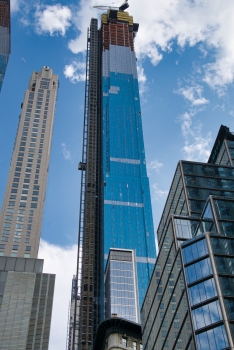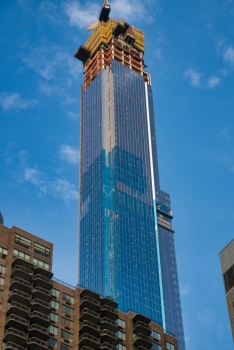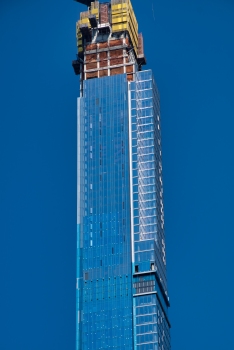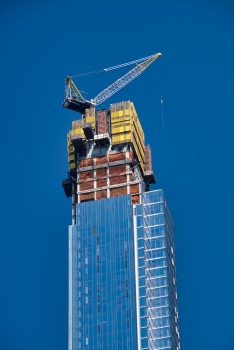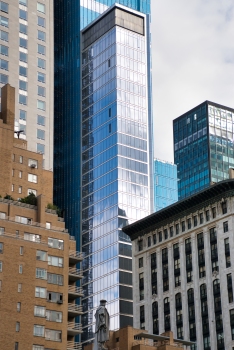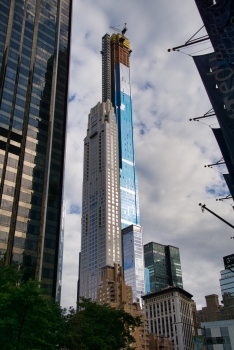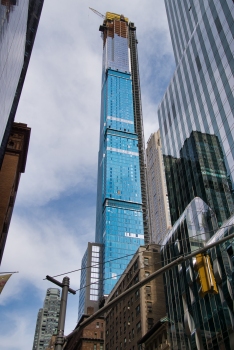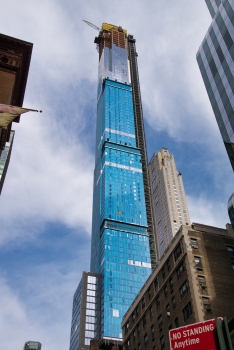General Information
Project Type
| Function / usage: |
Residential building |
|---|
Location
| Location: |
Manhattan, New York, New York, USA |
|---|---|
| Address: | 225 West 57th Street |
| Coordinates: | 40° 45' 58.07" N 73° 58' 51.31" W |
Technical Information
Dimensions
| height | 472.44 m | |
| number of floors (above ground) | 95 | |
| gross floor area | 119 409.0 m² |
Excerpt from Wikipedia
Central Park Tower (also known as the Nordstrom Tower) is a mixed-use supertall skyscraper being developed by Extell Development Company and Shanghai Municipal Investment Group along Billionaires' Row on 57th Street in Midtown Manhattan, New York City. The building rises 1,550 feet (472 m) and is the second-tallest skyscraper in the United States and the Western Hemisphere, the 15th tallest building in the world, the tallest residential building in the world, and the tallest by roof height of a building outside of Asia, surpassing the Willis Tower by 99 feet (30 m).
History
Planning
The site at 225 West 57th Street was originally home to an eight-story building built in 1909 as part of Manhattan's "Automobile Row" on 57th Street. Designed by Howard Van Doren Shaw, the New York City Landmarks Preservation Commission attempted to protect the building and the neighboring B. F. Goodrich Company showroom at 1780 Broadway in 2009, after a failed attempt at landmarking the structures in 1994. However, after pushback by Extell and Speaker of the New York City Council Christine Quinn, the Preservation Commission allowed Extell to tear down the structures while protecting only the facade of 1780 Broadway in a 6 to 3 vote. Some preservationists expressed dissatisfaction that the New York City Council had influenced the decision by making clear that they would veto any designation the Landmarks Preservation Committee made on the properties. Extell demolished 225 West 57th Street in 2011 and tore down 1780 Broadway at the end of 2012.
In the summer of 2012, Nordstrom committed to opening their first store in New York City, signaling their intent to occupy 225,000 square feet (20,900 m²) at the base of the tower. The company initially paid a $102.5 million down payment to occupy the first five floors of the building along with two basement floors. Around the same time, Extell purchased the neighboring building at 223 West 58th Street for $25 million and took out a new $300 million mortgage from The Blackstone Group on the assemblage. The new mortgage allowed Extell to repay a $250 million loan from HSBC on the properties.
At the end of the year, Extell revealed that Adrian Smith + Gordon Gill would design the tower and that it would rise 1,550 feet (470 m) to become the second-tallest building in New York City. Adrian Smith's firm, which had been recommended by Nordstrom, beat out other notable contenders for the design including Herzog & de Meuron, SHoP Architects, Jean Nouvel, Foster and Partners, and Rogers Stirk Harbour + Partners. At the time, the building was expected to rise 1,250 feet (380 m), open in 2018, and contain a hotel on floors seven through twelve.
In order to maximize views of Central Park, whose southern border is located two blocks north, Extell paid $31.8 million for 6,000 square feet (560 m²) of air rights and the ability to build a cantilever roughly 290 feet (88 m) above the Art Students League of New York's building at 215 West 57th Street. The cantilever would extend 23 feet (7.0 m) from the eastern side of Extell's building and cover roughly one third of the space above the Art Students League building. Extell had already purchased 136,000 square feet (12,600 m²) of air rights from the League in 2005 for $23.1 million. Without the cantilever, Vornado Realty Trust's under construction 220 Central Park South would have blocked the first 950 feet (290 m) of the tower.
In October 2013, Manhattan Community Board 5 voted against allowing the cantilever, although the vote was merely advisory and final power over the decision rested with the Landmarks Preservation Commission. Weeks later, the Landmarks Preservation Commission approved the air rights sale and cantilever in a 6-1 vote. At the same meeting, Extell revealed a revised design which would rise 1,423 feet (434 m) tall. In February 2014, the Art Students League also approved the deal in a 1,342-227 vote among all members despite opposition from several third parties including the Municipal Art Society.
Afterwards, over 100 members of the Art Students League filed suit against Extell and the Art Students League organization itself to attempt to stop the air rights sale, but the lawsuit was dismissed in the summer of 2014. Nearly two years later, 300 members of the League filed another lawsuit, this time against the leadership of the League, claiming that instructions on how to vote on the sale were misleading and that the publicized voting procedure was not followed correctly. According to the lawsuit, materials distributed by the League's leadership indicated that abstaining from voting would count the same as a "no" vote which allegedly led many members not to vote on the issue. Thus, the vote's tally should have been 2,603-1,342 against the air rights sale, if the members not voting had been counted the same as a "no" vote. The second lawsuit was dismissed through summary judgment when a judge ruled that the League's leadership had acted in good faith while interpreting the League's by-laws regarding voting procedures. When the members appealed, the appeals court upheld the decision since construction had progressed to a point where it could not be undone without causing undue hardship that would cost Extell more than $200 million.
Early construction and financing difficulties
In the middle of 2013, the state-owned Export-Import Bank of China was reportedly in negotiations to provide a $1 billion construction loan for the project. The loan would have been the largest construction loan in New York City since the Financial crisis of 2007–2008 and also the Chinese bank's first loan in the United States. As part of the deal, fellow state-owned enterprise China State Construction Engineering would have acted as the co-general contractor on the project's construction alongside Australian Lendlease Group. By November, Extell had demolished all the previous buildings on the site and the company began excavating the building's 80 feet (24 m) deep foundations in May 2014.
A new design for the tower was leaked in July 2014 that revealed a 1,479-foot-tall (451 m) tower with a spire reaching 1,775 feet (541 m), just a foot shy of One World Trade Center's pinnacle. After nearly a year of excavation, the building's concrete foundation was poured in February 2015.
New renderings were revealed on April 20, 2015, showing a roof height of 1,530 feet (470 m) and an architectural height of 1,775 feet (541 m) with the spire. However, new permits filed several months later showed the building without a spire but increased the roof height to 1,550 feet (470 m). At the same time, the building's official name of "Central Park Tower" was unveiled and the completion date was pushed back to 2019. The building's tower crane was installed in July 2015 and the structure reached street level by the end of September. The structural steel for Nordstrom's retail base was complete by the middle of 2016.
Central Park Tower under construction in October 2015
In August 2016, Extell faced the maturation of the $285 million land loan from Blackstone. In June 2016, Extell announced they were seeking to raise $190 million in financing for the tower from foreign investors through the EB-5 visa program. The company had previously raised $400 million by selling the retail portion to Nordstrom and an additional $300 million by issuing bonds on the Tel Aviv Stock Exchange. Around the same time, Extell also brought in the Shanghai Municipal Investment Group as an additional equity investor for roughly $300 million. With the additional cash in hand, Extell repaid $50 million of the Blackstone loan and extended the maturity on the remaining $235 million another six months to December 2016.
The additional capital didn't put an end to Extell's financing struggles as the building still required a roughly $1 billion construction loan. If the loan was not secured by May 2017, SMI could force Extell to repay its $300 million equity investment with interest. SMI was also entitled to an annual interest of 4.5% in monthly payments, as well as 30% of the development fees, and held final say over all major decisions. Additionally, the interest rate on Extell's bonds on the Tel Aviv Stock Exchange soared from 6% to over 16%, effectively turning them into junk bonds. Most pressingly, the refinanced Blackstone land loan was maturing in December 2016 and the interest rate would jump from 8% to 14% if Extell defaulted. By December 2016, Extell still did not have the cash to repay the land loan and secured only a one-week extension from Blackstone. On December 17, the day the land loan was due, Extell closed a new $235 million bridge loan with JPMorgan Chase and hedge funds Fortress Investment Group and Baupost Group in order to repay Blackstone.
By March 2017, Extell disclosed that it had spent $939 million on the development of the tower since 2014 including over $300 million in 2016 alone. The tower's completion date was also pushed back another year to November 2020. At the same time, the company raised another $25 million from Nordstrom, bringing the company's total commitment to $426 million. However, Nordstrom included a put option on its investment which allowed the company to force Extell to repurchase the space if the store was not delivered by December 2018. A further $168 million came from EB-5 investors and Extell hoped to raise that number to a total of $340 million, $150 million above their original goal.
At the end of May, Extell received approval to begin sales at the development. The company was targeting a total $4.02 billion sellout for the project's 179 condominiums, down from a $4.4 billion target two years earlier. However, the average unit price of $22.5 million was twice as much as the average sales price for a top New York City luxury apartment. Additionally, Extell hoped to sell 20 of the units for more than $60 million a piece, including a $95 million penthouse. An additional three duplex penthouses at the top of the tower were unpriced.
In May 2017, SMI could have exercised their put option to require Extell to repay their $300 million equity investment with interest, but instead the company extended the deadline. The new terms required Extell to secure a construction loan by the end of 2017. In June 2017, Israeli bondholders became concerned that Extell would be unable to meet its bond obligations as it held only $120 million in cash and still had not closed a construction loan for Central Park Tower. The yield on the bonds jumped by 7% to 13%, below their 2016 peak of 16% but still well into junk bond territory. A month later, over 40 private and institutional bondholders met to discuss whether to force early repayment on the bonds. Extell was scheduled to repay $180 million in December 2018 but investors were worried that the company could not raise the cash due to unrealistic pricing at Central Park Tower given the state of the luxury market.
Following the bondholder's meeting, Extell signed a term sheet for a $900 million construction loan with JPMorgan Chase in August 2017 after negotiating with lenders for over 18 months. Despite the term sheet, in August all of Extell's bonds' credit rating were downgraded by an Israeli bond rating agency after the company revealed it had just $36 million in cash on hand. In response, Extell revealed that they intended to close on the loan with JPMorgan before the end of the year. However, the company also admitted that while cash on hand was enough to cover construction costs in the "short term", they would not be able to sustain construction through 2018 without a loan. SMI also agreed to push back the deadline on their put option for a third time, from December 2017 to June 2018.
Final financing and construction
At the end of 2017, Extell announced they closed on $900 million in construction financing from JPMorgan Chase and an additional $235 million preferred equity investment from a hedge fund. The preferred equity carried an interest rate of 11% while the senior loan carried the unusually high rate of Libor plus 4.5%. JPMorgan required repayment of the loan by December 2021 and also stipulated that Extell must sell $500 million worth of apartments in three years by December 2020 or face default.
In March 2018, Extell announced they would be selling 17% of the equity in the tower to a group of investors for $107 million. The news sparked another downgrade of Extell's bonds, the second in less than a year. The same month, the tower's sales director left to rejoin Brown Harris Stevens after less than 6 months on the job. The tower reached the 1,000 feet (300 m) mark in the spring of 2018 and approximately 1,300 feet (400 m) by the end of the year. In October 2018, Extell officially launched sales at the project.
By the end of 2018, Extell had spent $1.7 billion on construction of the tower and expected to spend another $1.3 billion before the building opened. This total project cost of $3 billion was over $1 billion higher than the $1.9 billion that Extell expected construction to cost in 2016. Extell also increased the projected sellout of the building's condominiums to $4.5 billion or $7,450 per square foot, up from projections of $4.02 billion in May 2017 and higher even than the $4.4 billion in sales Extell expected in 2016. The company also unveiled new buyer's incentives in early 2019, offering to waive three years of common charges and pay 50% of broker's commissions.
Central Park Tower surpassed 432 Park Avenue in March 2019 as the building reached 1,400 feet (430 m). Construction reached over 1,450 feet (440 m) by the end of July 2019, surpassing Willis Tower in Chicago. In a September 2019 interview with Bloomberg Television, Extell founder Gary Barnett admitted that, "[condos aren’t] flying off the shelves like One57 did when we started six or seven years ago, when we were the only game in town. There’s certainly much more competition." He also signaled an openness to discounting units to increase sales in addition to the existing buyer's incentives. Central Park Tower topped out on September 17, 2019, the same day as One Vanderbilt.
Design
The building is designed by Adrian Smith + Gordon Gill Architecture. The first seven floors of the tower will be anchored by New York City's first Nordstrom department store. Floors eight to twelve will house amenity spaces for residents.
Condominiums
The building contains 179 condominiums starting on the 32nd floor, spanning on average 5,000 square feet (460 m²), with open layouts and oversized windows overlooking Central Park. Interiors of the building's condominiums are designed by Rottet Studio. Interior features include Miele and Sub-Zero appliances, custom cabinetry and white oak floors. A triplex penthouse at the top of the building will span 17,000 square feet (1,600 m²) across floors 129 through 131.
Amenities
There will be 50,000 square feet (4,600 m²) of amenities on floors eight to twelve. On the 14th floor, the building will feature the “Central Park Club” with a lounge, theater, conference room, play area and a tween lounge. A landscaped terrace designed by HMWhite will feature a 60-foot outdoor pool with pergolas and trellises, central lawn and two gardens. On the 16th floor, there will be a 63-foot indoor pool, exercise room, spa, gym, basketball court and children's playroom. There will also be a 126-person ballroom on the 100th floor with a cigar bar and private dining room.
Nordstrom
A Nordstrom department store, scheduled to open in October 2019, will cover roughly 285,000 square feet (26,500 m²) across the building's first seven floors. The store will contain six different bars and restaurants, including two operated by celebrity chef Tom Douglas.
Construction issues and incidents
A lawsuit was filed by the Art Students League, against their board for selling the rights to build the tower. However, the State Supreme Court judge dismissed the case stating that there was not enough evidence to support the claims of the 200 league members.
A 3,000-pound (1,400 kg) glass panel standing at the ground floor tipped over on top of a security guard at the building's construction site on May 26, 2018. The security guard was declared dead at the hospital. A construction worker at the scene had tried to rescue the security guard, and ended up fracturing his right foot. After the incident, the New York City Department of Buildings announced that it would order a halt on all construction work at the site, though work later resumed.
Text imported from Wikipedia article "Central Park Tower" and modified on 07 October 2019 under the CC-BY-SA 3.0 license.
Participants
Relevant Web Sites
- About this
data sheet - Structure-ID
20078433 - Published on:
01/10/2019 - Last updated on:
01/10/2019

